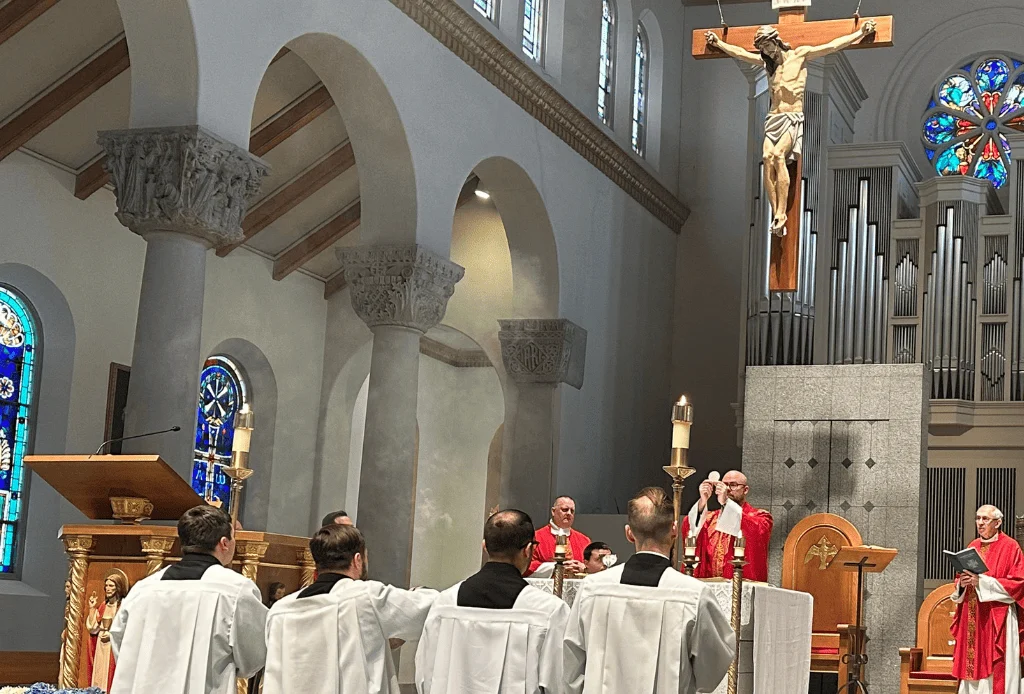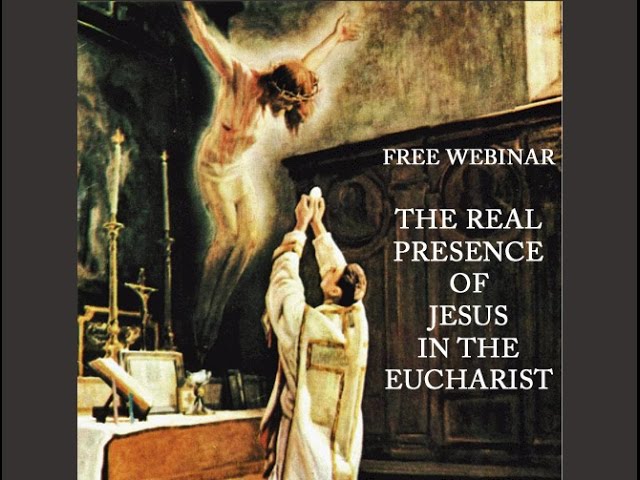
The Real Presence of Christ in the Eucharist is one of the central and most profound mysteries of the Catholic faith. It teaches that during the celebration of the Holy Mass, the bread and wine truly become the Body and Blood of Jesus Christ — not merely a symbol, but a real, substantial presence. This belief, rooted in Scripture and Tradition, invites every Catholic into deeper communion with Christ Himself.
Biblical Foundation of the Real Presence of Christ in the Eucharist
The Real Presence of Christ in the Eucharist is deeply rooted in Scripture. At the Last Supper, Jesus took bread and wine and said, “This is my body… This is my blood” (Matthew 26:26-28). He did not speak metaphorically but literally. In John 6:51-58, Jesus clearly teaches, “My flesh is real food, and my blood is real drink.”
From the earliest days of the Church, Christians have understood these words to mean that Christ is truly and substantially present in the Eucharist — Body, Blood, Soul, and Divinity.
The Meaning of the Real Presence of Christ in the Eucharist
The Real Presence of Christ in the Eucharist means that Jesus is not present symbolically but substantially. Through the process known as transubstantiation, the substance of bread and wine is changed into the substance of Christ’s Body and Blood, even though the appearance remains the same. This miracle occurs at every Mass during the consecration, allowing the faithful to encounter Christ in a deeply intimate and sacramental way.
Why the Real Presence of Christ in the Eucharist Matters
Believing in the Real Presence of Christ in the Eucharist transforms our spiritual lives. When we receive Holy Communion, we are united with Christ Himself — nourishing our souls, strengthening us against sin, and deepening our relationship with God. It also strengthens the unity of the Church, as believers become one body in Christ.
Receiving the Eucharist is not just a ritual; it is an encounter with the living God who desires to dwell within us.
Living the Mystery of the Real Presence of Christ in the Eucharist
Understanding this mystery should lead us to approach the Eucharist with reverence and love. Attending Mass, preparing our hearts through confession, and spending time in Eucharistic Adoration are ways we honor Christ’s Real Presence. As Saint John Paul II said, “The Eucharist is the source and summit of the Christian life.”
Conclusion
The Real Presence of Christ in the Eucharist is not just a doctrine but a divine reality that reveals God’s desire to be close to His people. Through this sacred mystery, we encounter the living Christ, receive His grace, and are transformed by His love. Belief in the Real Presence calls every believer to deeper faith, reverence, and communion with God.
Frequently Asked Questions (FAQs) on the Real Presence of Christ in the Eucharist
1. What is the Real Presence of Christ in the Eucharist?
The Real Presence of Christ in the Eucharist means that Jesus is truly present — Body, Blood, Soul, and Divinity — under the appearances of bread and wine after the consecration at Mass.
2. How is the Real Presence different from a symbol?
Unlike a symbol, which points to something else, the Real Presence of Christ in the Eucharist is a true and substantial presence. The bread and wine are not mere reminders — they truly become Christ Himself.
3. What is transubstantiation?
Transubstantiation is the process by which the substance of bread and wine is changed into the substance of Christ’s Body and Blood, while their outward appearance (taste, smell, color) remains unchanged.
4. Is the Real Presence of Christ in the Eucharist found in the Bible?
Yes. The belief is rooted in Scripture, especially in John 6:51-58, Luke 22:19-20, and Matthew 26:26-28, where Jesus clearly states that the bread and wine are His Body and Blood.
5. When does the Real Presence of Christ in the Eucharist occur during Mass?
It occurs at the moment of consecration, when the priest, acting in the person of Christ, speaks the words: “This is my body… This is my blood.”
6. Why is belief in the Real Presence essential for Catholics?
It is central to Catholic faith because the Eucharist is Christ Himself, and receiving Him strengthens our union with God, forgives venial sins, and deepens our spiritual life.
7. Do all Christians believe in the Real Presence of Christ in the Eucharist?
No. While Catholics, Eastern Orthodox, and some Anglican and Lutheran communities believe in the Real Presence, many Protestant denominations see the Eucharist as symbolic.
8. Can the Eucharist be worshipped?
Yes. Since the Eucharist is Jesus Christ truly present, adoring the Blessed Sacrament is an act of worship due to God alone. This is why Eucharistic Adoration is a key Catholic devotion.
9. What happens if a consecrated host is dropped?
It must be treated with utmost reverence. Usually, the priest or deacon will carefully pick it up and consume it or place it in water until it dissolves, then pour it into the sacrarium.
10. How should Catholics prepare to receive the Eucharist?
Catholics should be in a state of grace (free from mortal sin), observe the Eucharistic fast (one hour before receiving), and approach with faith and reverence.
11. Can someone who is not Catholic receive the Eucharist?
Generally, no. Because the Eucharist expresses full communion with the Church, only baptized Catholics in a state of grace may receive, except in very limited circumstances.
12. Does the Real Presence remain after Mass?
Yes. Once consecrated, the Eucharist remains the Body and Blood of Christ as long as the appearances of bread and wine remain. That’s why the Blessed Sacrament is reserved in the tabernacle.
13. What is Eucharistic Adoration?
Eucharistic Adoration is the practice of praying before the consecrated host displayed in a monstrance. It is a way of spending time with Jesus truly present in the Eucharist.
14. Why does the Church teach that Christ is “wholly and entirely present”?
Because Jesus is fully God and fully man. When we receive the Eucharist, we receive the whole Christ — not just part of Him — Body, Blood, Soul, and Divinity.
15. What spiritual benefits come from believing in the Real Presence of Christ in the Eucharist?
Believers experience deeper union with Christ, increased grace, spiritual strength against sin, growth in charity, and greater unity with the Church community.
16. Has belief in the Real Presence been constant throughout Church history?
Yes. Early Church Fathers like St. Ignatius of Antioch (1st century) and St. Justin Martyr (2nd century) wrote about the Real Presence of Christ in the Eucharist as a universally accepted truth.
17. How can I grow in faith in the Real Presence?
Regularly attend Mass, spend time in adoration, study Scripture passages about the Eucharist, read Church documents like Ecclesia de Eucharistia, and ask the Holy Spirit for deeper faith.

